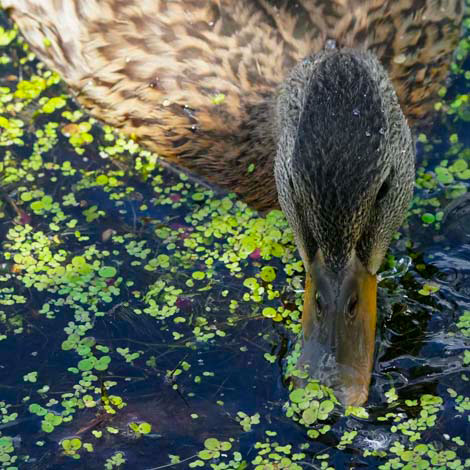Yes, many species of domestic ducks, including mallards, muscovy, and wood ducks, do eat duckweed. They tend to favor duckweed more when they are young and switch to other food sources as they mature into adulthood.
Ducks are drawn to lakes and ponds where duckweed is present, but they typically are not able to control a fast-growing duckweed population. In fact, many times ducks, birds, and other waterfowl actually contribute to the spread of this invasive plant. Duckweed leaves can stick to a duck’s feet as they leave one body of water and then take up residence in the next pond or lake where the duck lands.
What is Duckweed?
It can be difficult to determine just which weed is taking over your pond or lake. Duckweed is composed of green clover-shaped leaves which rest on the water’s surface. Each leaf measures about three-sixteenths to one-eighth of an inch in diameter and possesses a slender root that extends into the water. Duckweed leaves tend to cluster together, creating compact colonies.
Distinguishing duckweed from watermeal, a similar-looking weed, can be somewhat challenging. Watermeal is smaller, featuring more rounded and seed-like leaves. Additionally, watermeal lacks an attached root.
Still unsure of your weed type? Take a look at our Weed Control Guide to help identify your pond and lake weeds and determine the best treatment.
How to Eliminate Duckweed
If you have determined that duckweed is starting to take over your backyard lake or pond, there are a few things you can do.
Start with mechanical removal of duckweed using a rake or debris skimmer. Simply go over the surface of the water, removing any duckweed leaves along the way. The drawback to this method is that it is difficult to completely remove every leaf. Even a couple of leaves left behind can cause duckweed to regrow.
Herbicide is the most effective and efficient way to combat a duckweed outbreak. Aquatic weed control products such as Ultra PondWeed Defense and KnockDown Defense can help kill off duckweed and any other weeds that may be present. KnockDown Defense will also take care of floating algae, which may be impacting water quality and contributing to the duckweed problem. Combine these herbicides with Treatment Booster Plus to increase chemical effectiveness.
A long-term approach to duckweed management involves stronger herbicides such as WipeOut or Sonar A. S. by SePRO. These products contain fluridone, which can control aquatic weed populations over the course of an entire season when applied in the spring. Sunlight can reduce fluridone’s effectiveness, so we recommend the use of Pond Dye alongside WipeOut or Sonar.
How to Prevent Duckweed
Once you have eliminated your lake or pond’s duckweed population, the next step is prevention. Duckweed thrives in calm, stagnant water. Focusing on water quality and aeration is your best bet for keeping future duckweed outbreaks at bay.
Use an all-in-one pond care solution such as ClearPAC Plus to keep your water free from muck and debris all season long. And installing an Airmax Aeration system will help create enough water movement to discourage duckweed growth.
If you are still struggling with how to get rid of duckweed in pond water, contact the experts at The Pond Guy for additional help.
Read More Related Articles
Duckweed in Ponds
Treat & Control Duckweed
How to Treat Pond Weeds
How Fast Does Duckweed Grow?
Last Updated: July 18, 2023
